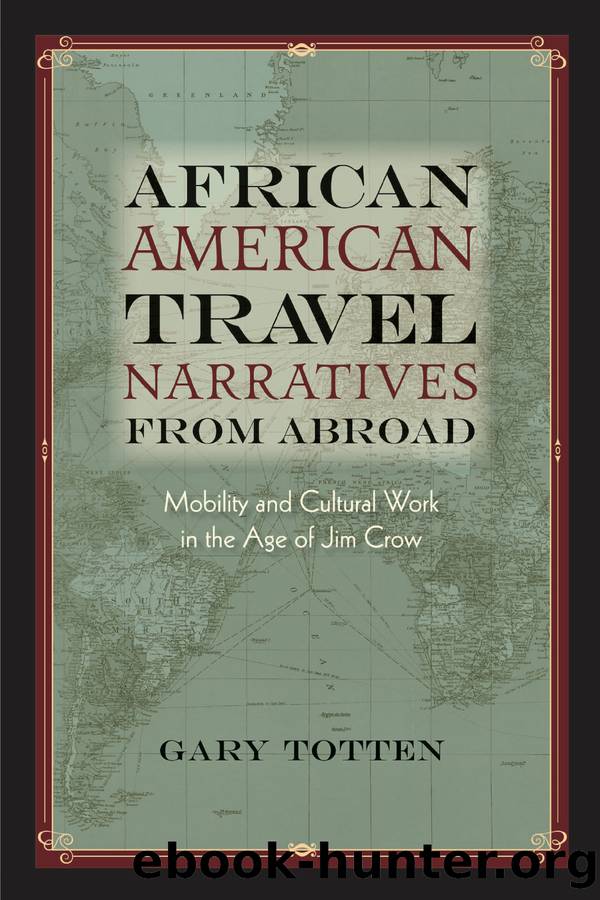African American Travel Narratives from Abroad by Gary Totten

Author:Gary Totten
Language: eng
Format: epub
ISBN: 9781613763636
Publisher: University of Massachusetts Press
As in other passages in Du Boisâs travel narratives, both the natural and human beauties of Africa are emphasized here, while the reference to the âvoidâ of Africa is a curious parallel to imperialistic representations of Africa as a blank space on a map.
At the end of the piece, Du Bois sustains his exotic portrait of Africa, in contrast to its âtamingâ or modernization:
The spell of Africa is upon me. The ancient witchery of her medicine is burning my drowsy, dreamy blood. . . . Africa is the Spiritual Frontier of human kindâoh the wild and beautiful adventures of its taming! But oh! the cost thereofâthe endless, endless cost [of turning it into a modernized society]. Then will come a day . . . when there will spring in Africa a civilization without coal, without noise, where machinery will sing and never rush and roar, and where men will sleep and think and dance and lie prone before the rising sons, and women will be happy.
Du Bois looks forward to the time when the iron routine of labor will have ceased to exist: âThe objects of life will be revolutionized. Our duty will not consist in getting up at seven, working furiously for six, ten and twelve hours, eating in sullen ravenousness or extraordinary repletion. NoâWe shall dream the day away and in cool dawns, in little swift hours, do all our work.â In the essay Du Bois mingles travel impressions with the political and cultural work of travel and uses his romanticized vision of what Africa is and could remain to argue against its âtaming.â55 Interestingly, the same iron routine that Stillman uses in her essay to argue for black strength Du Bois uses to argue for civil rights and the freedom to indulge in leisure activities, that is, to achieve the ability to fully embrace something similar to the tourist experience.
Du Boisâs writing about Africa in the June 1924 Crisis is more overtly focused on political and cultural issues. He writes of the challenges of âpioneeringâ in Liberia and provides sociological observations of African manners and family life. He critiques culture in the United States, noting that it has occurred to him, when âsee[ing] the awkward and ignorant missionaries sometimes sent to teach the heathen, that it would be an excellent thing if a few natives could be sent here [to the United States] to teach manners to black and white.â56 Du Bois focuses on the African individual, but not in the sensual or exoticized manner in which Stillman portrays the glistening black body or even in the same way that Du Bois himself depicts the sensual African body in his other travel pieces, as we have seen. In contrast to Wells, who actively deploys the black female body to enact cultural work, when Du Bois and Stillman turn their attention away from the spectacle of black bodies, they are able to focus more clearly on the cultural work of travel.
Fausetâs travel writing in The Crisis reveals some of the same characteristics, including the tendency to exoticize black bodies.
Download
This site does not store any files on its server. We only index and link to content provided by other sites. Please contact the content providers to delete copyright contents if any and email us, we'll remove relevant links or contents immediately.
4 3 2 1: A Novel by Paul Auster(12393)
The handmaid's tale by Margaret Atwood(7764)
Giovanni's Room by James Baldwin(7346)
Asking the Right Questions: A Guide to Critical Thinking by M. Neil Browne & Stuart M. Keeley(5775)
Big Magic: Creative Living Beyond Fear by Elizabeth Gilbert(5772)
Ego Is the Enemy by Ryan Holiday(5450)
The Body: A Guide for Occupants by Bill Bryson(5097)
On Writing A Memoir of the Craft by Stephen King(4944)
Ken Follett - World without end by Ken Follett(4732)
Adulting by Kelly Williams Brown(4574)
Bluets by Maggie Nelson(4556)
Eat That Frog! by Brian Tracy(4540)
Guilty Pleasures by Laurell K Hamilton(4449)
The Poetry of Pablo Neruda by Pablo Neruda(4109)
Alive: The Story of the Andes Survivors by Piers Paul Read(4033)
White Noise - A Novel by Don DeLillo(4010)
Fingerprints of the Gods by Graham Hancock(4004)
The Book of Joy by Dalai Lama(3986)
The Bookshop by Penelope Fitzgerald(3853)
